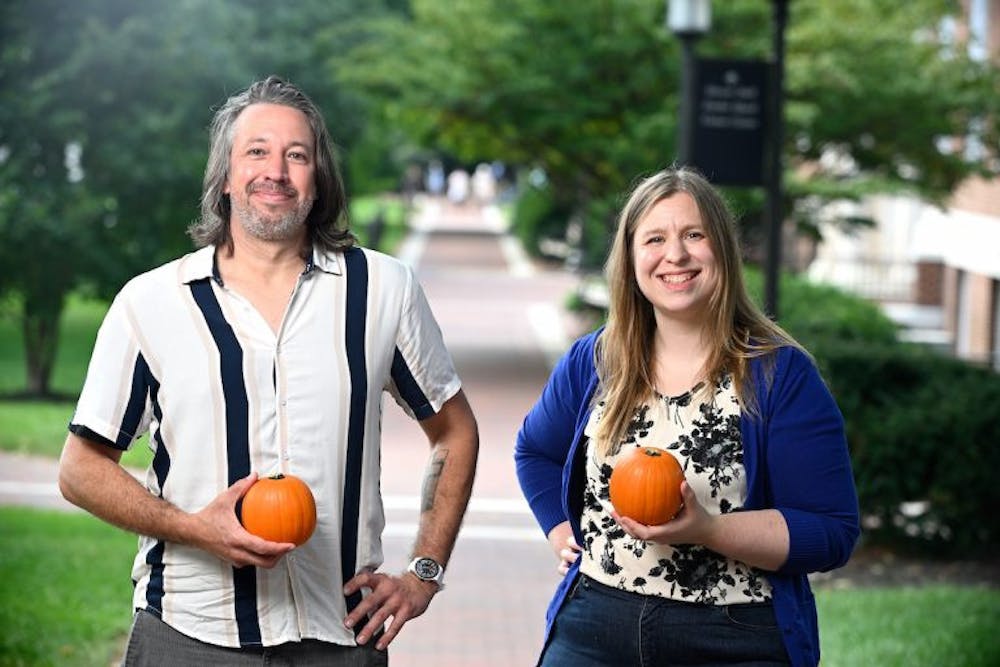Fall bears a distinct signature flavor: pumpkin spice. Pumpkin spice is a mixture of cinnamon, nutmeg, ginger, cloves and sometimes allspice, ingredients traditionally used to flavor pumpkin pie. Come autumn, its scent permeates coffee shops, cafés and bakeries. The comfort felt by many people while drinking or eating pumpkin-spice-flavored things derives from a complicated network of senses, emotion and memory that make up our perception.
Scent, or olfaction, has a special pipeline to the brain. According to Jason Fischer, assistant professor in the Department of Psychological & Brain Sciences, and Sarah Cormiea, doctoral candidate, it’s this connection that triggers the cozy feelings around pumpkin spice. All of our memories surrounding fall — hot drinks, sweaters, falling leaves and reuniting with school friends — are inextricably linked to the scent.
In an interview with The News-Letter, Fischer discussed the importance of smell in memory.
“The link between smell and memory is a particularly strong and vivid one. Smells have special access to our memories, both in the formation of and the retrieval of them,” he said.
In addition to evoking memories and emotions, smell is also critical to the experience of taste because when we eat, tiny particles of food travel up the back of our throat and activate our smell receptors.
Fischer claims we tend to underestimate the importance of our sense of smell despite its numerous roles in sensing and memory.
“People who lose their sense of smell often don’t anticipate the variety of ways it can affect their daily experience,” he said. “If you’ve played the game ‘which sense would you lose if you had to lose one,’ smell might seem like a sort of easy one to go to, but it’s not the right answer.”
In an interview with The News-Letter, Cormiea discussed an easy way to gauge the importance of smell is in its role in taste.
“If you pinch your nose and eat a Dorito, you’d crunch, crunch, crunch and then think ‘okay, that just tastes like salty, crunchy, cardboard,’” she said.
Without smell, our taste lacks nuance. Stuffy nasal passages from allergies or a cold can also illustrate this.
While smell is key, Cormiea noted that our other senses also have roles to play in taste.
“You’re tasting it with your tongue, but you’re also incorporating information that is coming from things like texture and temperature and even some sounds from what you’re crunching on,” Cormiea said.
All of that input gets “referred” to our mouths, making it seem like all our taste is coming from the mouth when it’s really an amalgamation of all of our senses processed at different places. Referral is just one of many tricks our mind plays when it comes to sensory perception.
Cormiea explained that context can also shift our expectations.
“If you walk into a bakery and you smell a smell and it’s earthy and spicy, you might think it’s cinnamon. But if you walk into a pizza shop and you smell it, you might think it’s oregano,” she said.
Another example of the effects of context is the taste and smell of butyric acid, a chemical found in parmesan cheese, Hershey’s chocolate and vomit. Based on the context, the smell gets vastly different reactions.
The Fischer lab uses various tools and methods to study perception. One method is by asking participants direct questions about what they’re perceiving. Another way is through using machines like functional magnetic resonance imaging and infrared vision trackers. These tools have allowed the Fischer lab to examine our sensory perception in dynamic environments that mimic our everyday world.
Cormiea discussed what the scent of pears means to her.
“There was a pear tree in my backyard when I was a kid and I have very strong memories of very ripe, juicy pears in the summertime,” she said.
For Fischer, one particular scent connects him back to his university days.
“When I was in college I did a summer abroad in Italy. When I got there, I went to a corner store and I bought some cheap stuff, and one of them was this cheap drugstore cologne,” he said. “That’s what I had the entire summer, and I kept it. It eventually ran out. This stuff was two euros when I bought it there, but it cost me 15 euros to get it shipped. I still have some [today] and any time I smell it, it very vividly transports me back to that time.”





